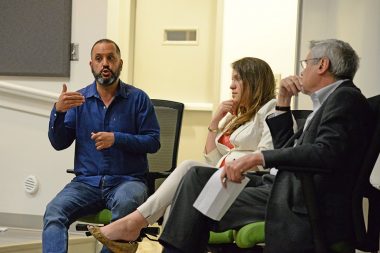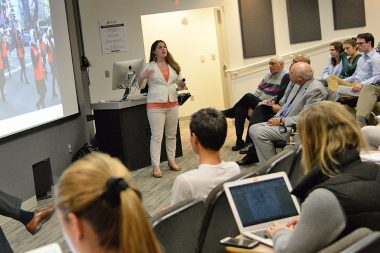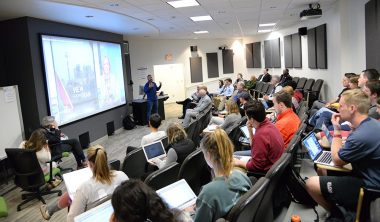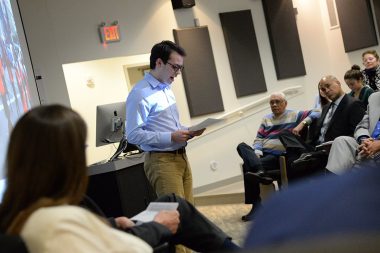Elon University, a Campus Consortium partner of the Pulitzer Center on Crisis Reporting, hosted an April 5 community lecture featuring veteran reporters Rachel Oswald, Reza Sayah and Tom Hundley.
The evening before Congressional Quarterly published her in-depth report on South Korea’s perspectives on nuclear weapons, journalist Rachel Oswald walked an audience of Elon University students and faculty through her coverage as part of an April 5 community lecture. The on-campus event was coordinated through the Pulitzer Center on Crisis Reporting.

The lecture, held in the McEwen screening room, also included a lively Q&A session with inquiries about the international perception of the U.S., the stability of Iran’s government, the threat of nuclear war from North Korea, and the overall impact of nuclear weapons in the Middle East and Far East.
Photos of the lecture are available on the school’s Flickr account.
Following an introduction from Hundley, Oswald opened the lecture with a recap of her interest in the Korean peninsula.
Having covered North Korea “on and off” since 2009, Oswald noted that she has heard “fringe voices” in South Korean news outlets often call for the country to acquire nuclear weapons. While that opinion has “always been part of the political conversation,” she said, North Korea’s progress with nuclear warheads and ballistic missiles has given these concerns more merit.

With that objective in mind, Oswald pitched Hundley her story idea and the Pulitzer Center supported her travel and reporting earlier this year.
During her lecture, she delved into her coverage that concentrated on one main question: Will South Korea get a nuclear weapon? Her conclusion: Likely yes, if two things happen. First, the North Korea crisis needs to get worse. Secondly, South Korea needs to doubt the U.S. military alliance. “This is a sign to really, really watch,” she said.
She then addressed the possibility of South Korea building its own nuclear weapons program, developed on the strength of its advanced atomic energy program. She also discussed the well-orchestrated conservative protests in Seoul, and how they were commandeering the national conversation, and the role that emotions could play in South Korean’s decision making.
While traditionally conservative, South Korea’s recently elected government officials and staff are liberal leaning. There is noticeable friction between the country’s political parties.
“This debate isn’t about military advantage, it’s about feelings,” Oswald said.

Last fall, when U.S. President Donald Trump declared that he would not certify Iran’s compliance with the 2015 nuclear agreement, “PBS NewsHour” dispatched Sayah to Tehran for a news feature segment on the nuclear deal from Iran’s perspective. Before playing the “NewsHour” segment for the audience, he outlined his objectives and his role as a reporter.
“Being in Iran, being in that region in general, I see it as my duty to provide the U.S. audience Iran’s perspective,” Sayah said. “That’s one thing lacking in U.S. media. We hear Washington’s narrative. We hear the West’s narrative. But in order to solve a problem, we have to understand the other side.”
Sayah explained he tries to ensure that his reporting presents an “accurate picture of what Iran is and not the caricature that it’s been painted for many years in U.S. media.”

This year, journalism major Paul LeBlanc ’18 was awarded a Pulitzer Center Student Fellowship and spent a week in London investigating deradicalization programs in English prisons. He will publish a report on his findings in a few weeks. Before the lecture, LeBlanc provided introductions for the three journalists.
As part of their campus visit, Oswald, Sayah and Hundley also spoke with two communications classes, an honors course, and members of the student-run Elon News Network. Additionally, they appeared on the April 5 telecast of “ELN Morning” to discuss their reporting.
The April 5 lecture was sponsored by the School of Communications, the Department of Political Science & Policy Studies, and the Turnage Family Faculty Innovation and Creativity Fund for the Study of Political Communication.


